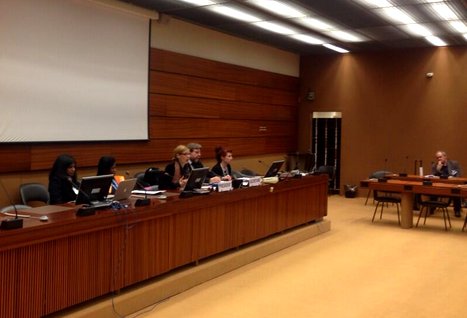 |
An event hosted by NGOs on the sidelines of the 25th session of the UN Human Rights Council examined issues of gender based violence in an ethnocracy, in the context of Sri Lanka.
The event, hosted by the Society of Threatened Peoples (STP), Tamils against Genocide (TAG), TRIAL, The Sentinel Project, CNRJ and Sri Lanka Advocacy, started with a statement by Kelebone Skelemani, read out by the moderator of the panel, Theodor Rathgeber. Others on the panel were Jan Jananayagam of TAG, Angela Mattli of STP, Anna Gall of the European Centre for Constitutional Rights, and Ananthy Sasitharan, a TNA councillor in the northern province of Sri Lanka.
Ms. Skelemani, the former Deputy Permanent Secretary in the ministries of health, trade and home affairs in Botswana, said the debate “Sri Lanka: Torture, Sexual Violence in a context of Ethnicity and Failed Domestic Processes”, came at an “opportune time”, as it complemented the ongoing efforts by the UN to find a permanent solution to problems facing Sri Lanka.
“The report of the United Nations High Commissioner for Human Rights […] concludes, among others, that human rights violations in Sri Lanka continue unabated,” she said.
“The same report also concludes that even where the Government has launched initiatives and established mechanisms such as military courts of enquiry, the initiatives lack independence to be effective and to inspire confidence.”
Ananthy Sasitharan, speaking through an interpreter, described how she witnessed the surrender wives of LTTE cadres, including pregnant women, and young children, to the Sri Lankan armed forces. She said these women were still missing, with the government staying silent on the issue.
Even those women who were released, are under constant surveillance and are still requested to report to army camps for interrogations, she said, adding that she has heard of several instances of Tamil women being forced to join the Sri Lankan Army.
Anna Gall spoke about gender based violence and why it requires a specific accountability mechanism. Gender based violence was not only physical violence but it underlined structural discrimination against women, she said.
Gall said that discrimination still continues, and reprisals and stigmatisation continues. The Prevention of Terrorism Act stops women from speaking up about issues, as they risk being accused of having LTTE links and arrested. She said that her organisation had reports of forced contraception and survival sex, where women without social and economic rights are desperate.
She called on the UNHRC to look into witness protection mechanisms as there is a lack of witnesses who are willing to come forward to report abuses.
Next to speak was Jan Jananayagam of Tamils against Genocide. Ms. Jananayagam looked at how British law treated asylum seekers who were subjected to torture and described how the UK’s country guidance on Sri Lanka was changed as a result of overwhelming evidence of torture and sexual abuse.
Angela Mattli of The Society of Threatened Peoples explained how bringing attention to two asylum seekers who were tortured on their return to Sri Lanka, caused Switzerland to call a temporary halt on deportations.
